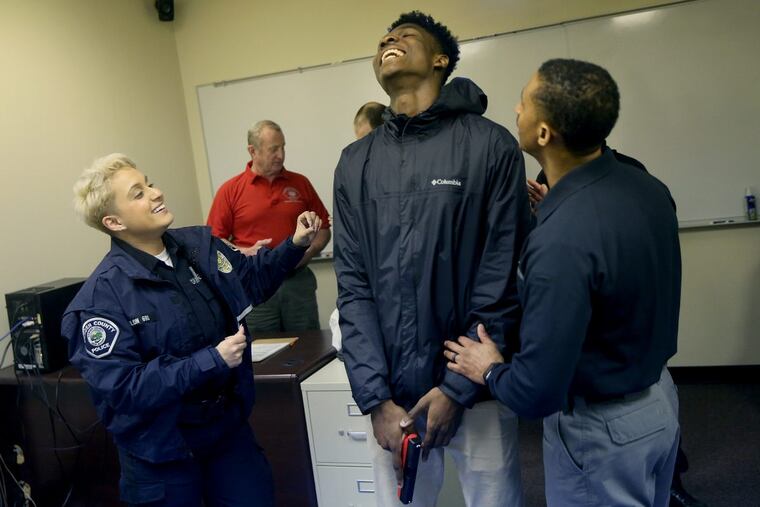Camden youth get recruit training to break down barriers with police
Camden City youth participate in training at police academy in program that seeks to break down barriers with the Camden County Police Department.

High school senior Vaughn Williams has plenty of law enforcement officers in his family, but the Camden teen had never thought about following in their footsteps — until now.
After spending several hours Friday with the Camden County Police Department and getting a behind-the-scenes look at how officers are trained to patrol Camden's streets — once deemed the most dangerous in America — Williams, 18, said he might consider a career in law enforcement after all.
He was among about a dozen Woodrow Wilson High School students who took a field trip to the Camden County Police Academy in Blackwood. They participated in modified exercises designed for recruits to show the students real-life scenarios that officers face daily.
"It's getting them to understand that officers protect and serve in many different ways," said Sgt. Raphael Thornton, the lead instructor at the academy and a member of the department.
The program, sponsored by the Policing Project at New York University School of Law, was launched in 2016 at high schools in Camden and Tampa, Fla., to engage youth around policing issues in their communities. It is the latest effort by the county department, which took over from the former Camden City police force in 2013, to help break down barriers and gain public trust.
"A big part of our program is to have them experience life from the other side," said Katie Kinsey, program manager for the nonprofit. The students usually meet weekly at the high school during lunch, where they have frank conversations with six officers assigned to the project. The program runs for 20 weeks.
It also gives police a chance to have a "positive impact on kids who may not have the most fond views of the police," said Lt. Kevin Lutz, deputy director of the academy, which trains about 150 officers annually for departments across the region.
"They get to see us as human beings and people first," Lutz said.
After classroom lectures Friday morning taught by academy instructors on how to de-escalate a crisis, the students were given a chance to apply what they learned in simulation rooms. The officers served as actors who played out the scenarios.
In one scenario, Williams, accompanied by a classmate, Jose Irene, 17, confronted an emotionally disturbed woman threatening to jump from a bridge. Williams maintained his composure as he confronted the woman, played by Sgt. Vilmary Otero. Irene acted as the backup officer, occasionally chiming in.
"What are you doing up there?" Williams asked.
"I'm taking a walk," Otero responded, standing on top of a desk in the classroom. "You don't know what I'm going through."
Williams kept Otero talking, building trust and reminding her to think about her family. He promised to help but then recalled his training instructions not to make any promises that he cannot fulfill, so said, " I will do everything I can."
"You did really good. I'm really proud of you," Otero told Williams, giving him a big hug.
The exercise was an eye-opener, Williams said.
"Coming in here, I never thought about being a cop," he said. "Doing this kind of stuff makes me think I might be good at it."
In a darkened room known as the MILO range, the students took turns practicing their skills handling mock scenarios where they were confronted by situations that required quick thinking: a burglary in progress, a gunman inside a school cafeteria, and a call for a husband holding a gun to his wife's head.
Standing in front of a simulation screen on a large wall where the scene unfolded quickly, the students had to decide whether to seek cover, fire a fake Glock 22, call out commands, or request assistance. Some stood frozen, while others emptied rounds from the weapon. They debriefed with the instructors after each simulation.
"You just shot an unarmed man and killed him," said Officer Danielle Colon, a four-year veteran of the force, during a debrief. "Guess who's going to jail for life? You."
Thornton, a 22-year veteran who grew up in Camden, told the students, "Don't stereotype police officers." He encouraged them to consider giving back to their community as law enforcement officers.
As the program ended, Williams raised his hand with a question:
"How do I become a cop?"
"Take the civil service exam," Thornton responded with a smile.